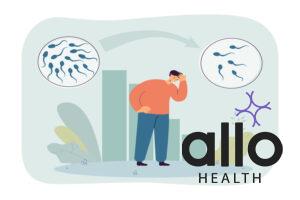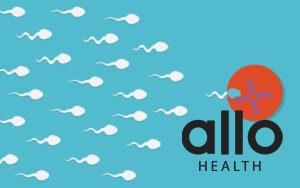Understanding Sperm Leakage During Stool

Allo Health is dedicated to personalized well-being, offering support and trusted information tailored to individual health goals. The platform emphasizes human-generated content, led by a distinguished medical team of experts, including physicians and sexual health specialists. Their commitment to credibility involves rigorous fact-checking, authoritative research, and continuous updates to ensure accurate, up-to-date information. Allo Health's unique approach goes beyond conventional platforms, providing expert-led insights and a continuous commitment to excellence, with user feedback playing a crucial role in shaping the platform's authoritative voice.

Dr. Warisha holds an MBBS degree from GMERS Medical College, Ahmedabad. She has an in depth experience on sexual and reproductive health and rights.
Why This Was Upated?
Our experts continually monitor the health and wellness space, and we update our articles when new information became available.
Updated on 18 December, 2023
- Article was updated as part of our commitment to diversity, equity, and inclusion.

"The following blog article provides general information and insights on various topics. However, it is important to note that the information presented is not intended as professional advice in any specific field or area. The content of this blog is for general educational and informational purposes only.
Book consultation
The content should not be interpreted as endorsement, recommendation, or guarantee of any product, service, or information mentioned. Readers are solely responsible for the decisions and actions they take based on the information provided in this blog. It is essential to exercise individual judgment, critical thinking, and personal responsibility when applying or implementing any information or suggestions discussed in the blog."
Sperm leakage during stool can be a delicate topic to discuss, yet it is a common concern among many men. This situation can cause embarrassment, anxiety, and even guilt, especially if individuals associate it with a sexually transmitted infection or infertility. However, sperm leakage during stool is a natural occurrence and is often harmless.
In this article, we will explore the causes of sperm leakage during stool, how to prevent it, and when it is necessary to seek professional medical help.
What is Sperm Leakage and How Does it Happen?
Sperms are the male reproductive cells produced by the testes, it is contained in semen which is a whitish fluid released during ejaculation.
Sperm leakage during stool occurs when semen, the fluid that contains sperm, leaks out of the penis during bowel movements.
Semen consists of sperm cells, seminal fluid, and prostate gland secretions produced by the seminal vesicles. When these components mix, they form semen, which is normally ejaculated during sexual intercourse.
However, in some cases, semen can leak out of the penis during bowel movements without any arousal or stimulation.
This condition is known as spermatorrhea and can be caused by a variety of factors such as excessive masturbation, hormonal imbalances, and infections. It can also be a symptom of underlying medical conditions such as prostate problems or nerve damage.
If you are experiencing an increase in the frequency of semen leakage or excessive semen leakage during bowel movements, it is important to consult a healthcare professional for medical advice, to determine the underlying cause and receive appropriate treatment.
Common Causes of Sperm Leakage During Stool

Several factors can cause sperm leakage during stool. One of the most common causes is excessive masturbation or sexual activity. When an individual engages in sexual activity or masturbates frequently, the prostate gland produces more seminal fluid, increasing the likelihood of sperm leakage during bowel movements.
People taking certain medications, hormone treatments or having physical health conditions that affect nerves like stoke, multiple sclerosis and diabetes, may notice changes in ejaculation and sexual function such as erectile dysfunction and semen leakage.
Another cause of sperm leakage during stool is constipation. When an individual is constipated, hard and dry stool puts pressure on the prostate gland and the surrounding muscles, causing semen to leak out of the penis.
Individuals with hemorrhoids, anal fissures, or other anal conditions may experience sperm leakage during bowel movements because of the pressure and friction involved.
Other causes maybe more indirect than direct. For example, prostatitis caused by a bacterial infection affects sexual function. These, in turn, may cause sperm leakage.
Sperm leakage during stool is not always a cause for concern. However, if it occurs frequently or is accompanied by pain or discomfort, it is recommended to consult a qualified health provider for treatment for sperm leakage. They can help determine the underlying cause and provide appropriate treatment options.
The Role of the Pelvic Floor Muscles in Preventing Sperm Leakage
The pelvic floor muscles play an essential role in preventing sperm leakage during stool. These muscles support the bowel, bladder, and reproductive organs, and control the release of semen during sexual intercourse. Weak pelvic floor muscles can lead to sperm leakage during bowel movements, sexual intercourse, or even when coughing or sneezing.
To strengthen the pelvic floor muscles, individuals can perform Kegel exercises, which involve contracting and holding the muscles for 5-10 seconds, then releasing. It is recommended to practice Kegels regularly for at least 6-12 weeks to see optimal results.
Maintaining a healthy diet and weight can also help prevent sperm leakage. Obesity and a high-fat diet have been linked to weakened pelvic floor muscles, which can lead to sperm leakage. Eating a balanced diet and engaging in regular physical activity can help maintain a healthy weight and strengthen the pelvic floor muscles.
How Hormonal Imbalances Can Lead to Sperm Leakage
Hormonal imbalances can also contribute to sperm leakage during stool. For instance, high levels of testosterone, the male sex hormone, can stimulate the prostate gland to produce more seminal fluid, leading to more sperm leakage.
On the other hand, low levels of testosterone can cause a decrease in prostate gland size, leading to weaker muscle contractions and thus, more sperm leakage.
Furthermore, lifestyle factors such as excessive alcohol consumption and smoking can also contribute to hormonal imbalances and increase the risk of sperm leakage during bowel movements.
Avoid a sedentary lifestyle and seek medical attention if you experience frequent or excessive sperm leakage during bowel movements.
Dietary Factors That Can Cause or Prevent Sperm Leakage
What we eat can also play a role in preventing or causing sperm leakage during stool. For instance, a diet rich in fiber can help prevent constipation, reducing pressure on the prostate gland and preventing sperm leakage. Additionally, a diet rich in fruits, vegetables, and nuts can provide essential vitamins and minerals that support prostate health and function.
On the other hand, consuming excessive amounts of caffeine, spicy foods, and alcohol can irritate the bladder and prostate gland, leading to more frequent urination and increased pressure on the pelvic floor muscles. This can result in more sperm leakage during bowel movements or other activities.
Dehydration can contribute to sperm leakage during bowel movements. When the body is dehydrated, the stool can become hard and difficult to pass, putting pressure on the prostate gland and increasing the likelihood of sperm leakage. Therefore, it is essential to drink plenty of water and other fluids to keep the body hydrated and the stool soft.
Treatment for Sperm Leakage During Stool: Tips and Strategies

There are several tips and strategies that individuals can use to prevent or reduce sperm leakage during stool. For instance, practicing good bowel habits, such as maintaining a regular bowel movement schedule and avoiding straining during bowel movements, can help reduce pressure on the prostate gland and pelvic floor muscles.
Additionally, avoiding excessive sexual activity or masturbation can reduce seminal fluid production and prevent sperm leakage. Practicing relaxation techniques, such as meditation or yoga, can also reduce stress and anxiety, which can contribute to sperm leakage.
Another strategy to prevent sperm leakage during stool is to maintain a healthy diet and lifestyle. Eating a balanced diet that is rich in fruits, vegetables, and whole grains can help regulate bowel movements and reduce constipation, which can put pressure on the prostate gland and pelvic floor muscles. Regular exercise can also help improve bowel function and reduce stress levels.
In some cases, medical treatment may be necessary to address sperm leakage during stool. This may include medications to reduce inflammation or infection in the prostate gland, or surgery to repair any damage to the pelvic floor muscles. It is important to consult with a healthcare provider to determine the best course of treatment for your individual needs.
When to See a Doctor for Sperm Leakage During Stool
If an individual experiences persistent or severe sperm leakage during stool, they may need to seek medical attention. In some cases, sperm leakage may be a sign of an underlying medical condition, such as an infection, prostatitis, or an enlarged prostate gland. These conditions can cause discomfort, pain, and other symptoms, and may require medical treatment.
Sperm leakage during stool can also be a result of sexual activity. If an individual has engaged in sexual activity prior to experiencing involuntary ejaculation of semen , it may not necessarily be a cause for concern. However, if the leakage persists or is accompanied by other symptoms, it is still recommended to seek medical attention.
Additionally, there are certain lifestyle factors that can contribute to sperm leakage during stool. These include a poor diet, lack of exercise, and excessive alcohol or drug use. Making changes to these habits may help alleviate symptoms and prevent future occurrences of sperm leakage.
Frequently Asked Questions
Q: What are some alternative treatments for semen leakage?
A: Some alternative treatments for semen leakage are:
- Kegel exercises: Strengthening the pelvic floor muscles through Kegel exercises may help improve control over ejaculation and reduce sperm leakage.
- Herbal supplements: Some herbal remedies, such as ashwagandha, safed musli, and shilajit, are believed to support sexual health and may help in managing sperm leakage.
- Lifestyle changes: Adopting a healthy lifestyle with regular exercise, a balanced diet, stress management, and sufficient sleep can positively impact sexual health and potentially reduce sperm leakage.
It is recommended to consult with a healthcare professional before trying any alternative treatments to ensure safety and effectiveness.
Q: What if I notice blood in semen?
A: If you notice blood in your semen, also known as hematospermia, it can be a cause for concern but is often not a serious issue. It may be due to various factors, including inflammation, infection, or injury in the reproductive system. However, you must consult with a healthcare professional to determine the underlying cause and receive appropriate evaluation and proper treatment if needed.
Q: I noticed sperm leakage after urination. Should I be concerned?
A: Sperm leakage after urination can be a normal occurrence and is usually not a cause for concern. It is likely residual semen that was not ejaculated during sexual activity and is being expelled from the urethra during urination. But it’s best to consult with a healthcare professional for reassurance and proper evaluation if you have persistent or concerning symptoms
Q: What is the treatment for sperm leakage?
A: The treatment for sperm leakage depends on the underlying cause. If it’s due to normal physiological processes or residual semen, no specific treatment is needed. If it becomes bothersome or is associated with other symptoms, consulting a healthcare professional can help identify any potential issues and determine appropriate treatment options.






































